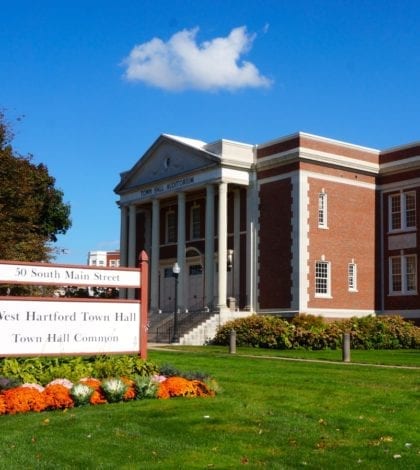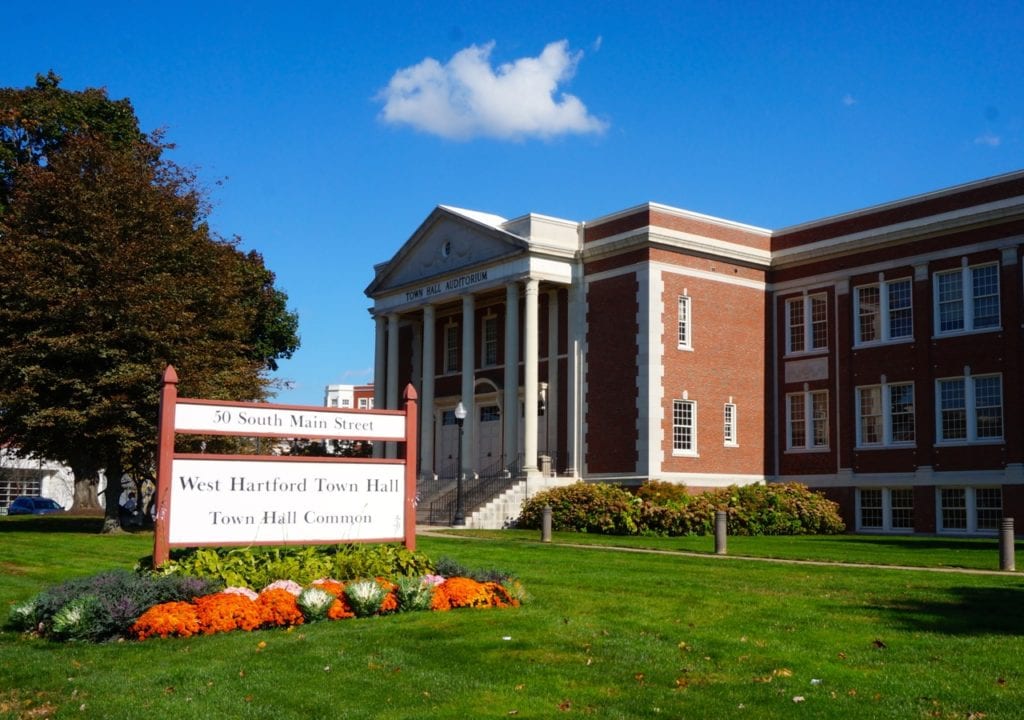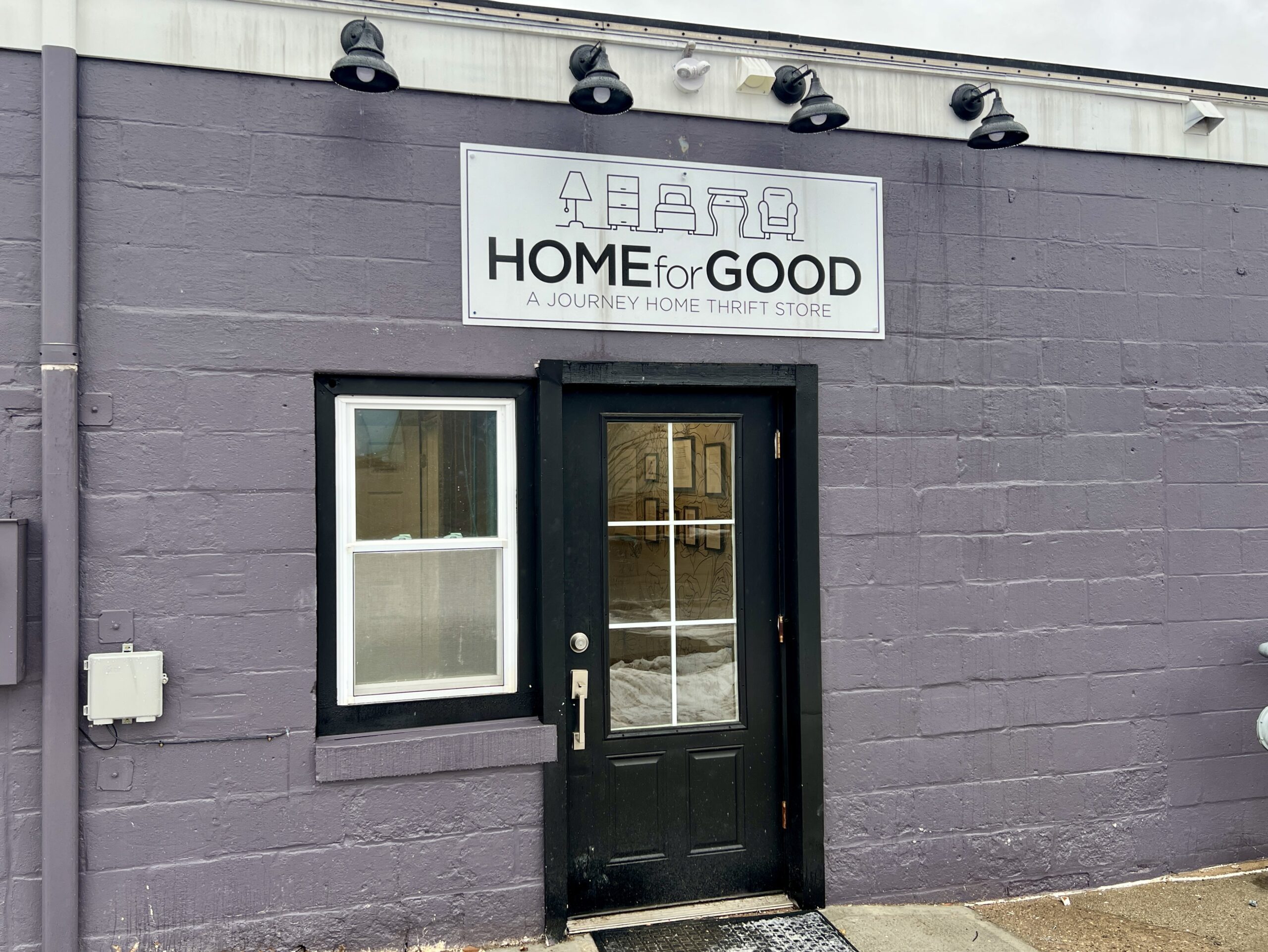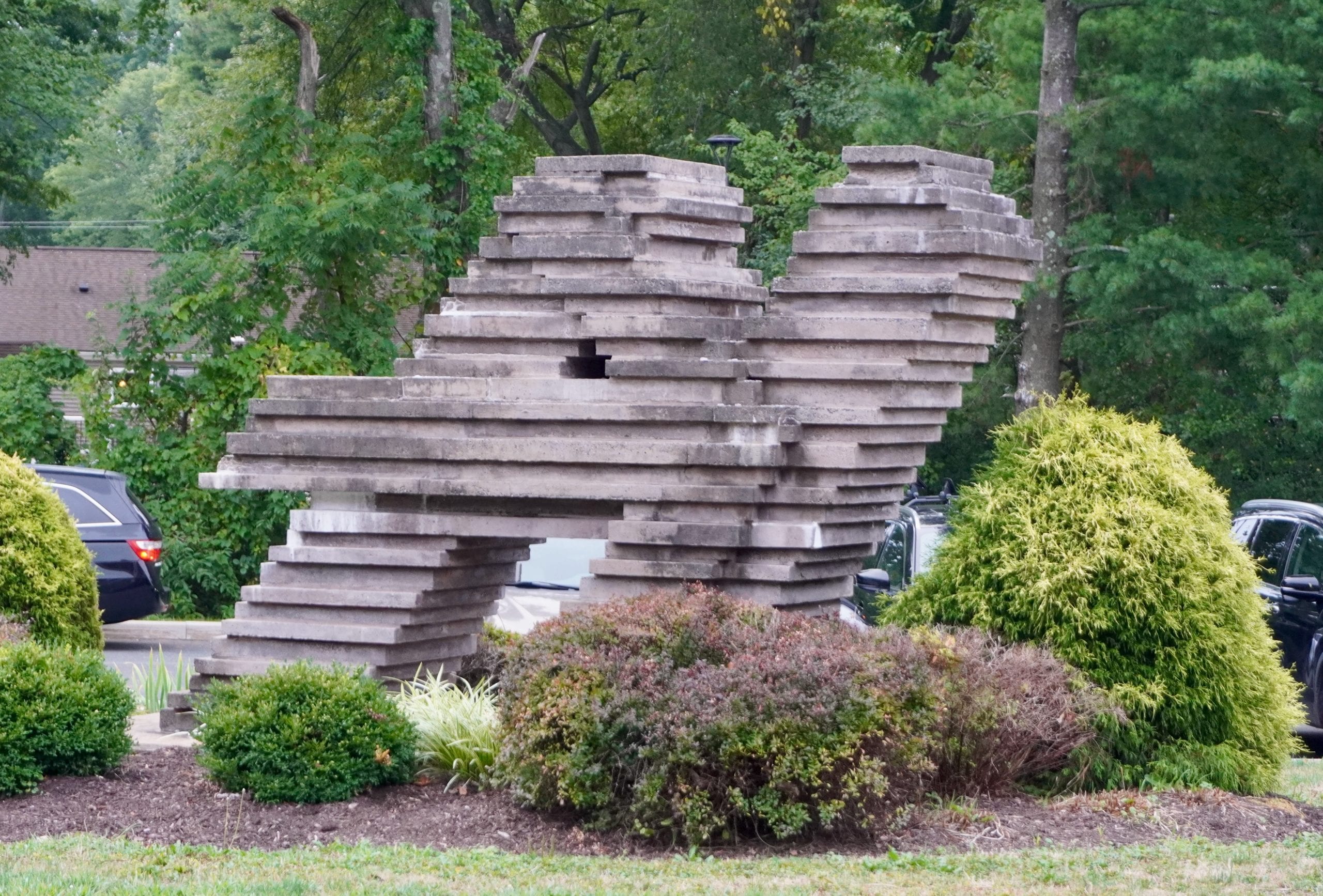West Hartford Town Manager's $287.3 Million Budget is Double-Digit Percentage Increase

Audio By Carbonatix

West Hartford Town Hall. Photo credit: Ronni Newton
The proposed 2017-2018 General Fund budget for West Hartford, which incorporates the state budget proposed by Gov. Dannel P. Malloy, includes an overall $25.4 million increase.

West Hartford Town Hall. Photo credit: Ronni Newton
By Ronni Newton
West Hartford will need an additional $25,396,405 in revenue for FY2018 according to the General Fund budget presented to the Town Council Wednesday night.
Expenses will rise by $19.4 million, non-tax revenues are down by $6.4 million, and the impact is $25.4 million, or a total property tax increase of 11.1 percent.
West Hartford had a positive 4.3 percent growth in the town’s Grand List. Some of that was the result of the five-year revaluation, but $47.1 million was new construction – projects like the Delamar Hotel as well as apartment and condominiums. Those new taxpayers will add $1.86 million in revenue.
That brings the overall tax increase that needs to be met by existing taxpayers to 10.3 percent.
To reach the town’s revenue requirements, the proposed mill rate for real and personal property is 42.76 mills, an increase of 3.25 mills from the current mill rate of 39.51. For FY2018, the state is requiring a cap on the motor vehicle mill rate of 32 mills. Last year the motor vehicle mill rate was capped at 37 mills.
The 2017-2018 budget it “probably the most difficult budget we’ve had in decades,” Town Manager Ron Van Winkle said. For Van Winkle, who will retire on June 30, 2017, it’s also his final budget.
Van Winkle said that “shocked” could not adequately describe the numbers facing town taxpayers, with a substantial tax increase driven primarily by the state’s shifting of costs to municipalities. “West Hartford is impacted more than most communities,” Van Winkle said. Without the cuts in state aid to West Hartford proposed in the budget presented by Gov. Dannel P. Malloy on Feb. 8, the town would have had a modest increase in its budget, Van Winkle said, but instead it is something that will be very difficult to work through to make manageable for the community.
The proposed state budget’s total impact on the town, as compared to the FY2017 budget that the West Hartford Town Council adopted last April, is $11.7 million. The Town Council took a conservative route in adopting last year’s budget and the state ultimately gave the town about $2.67 million more Educational Cost Sharing (ECS) funds than West Hartford had budgeted. In reality what the governor is proposing this year is an $8.7 million decrease in ECS funding from the state – an overall $14.5 million cut in aid to West Hartford.
The ECS funds are part of the town’s general fund budget, whereas most of the other changes in state aid impact the West Hartford Public Schools budget, which was presented Tuesday night by Superintendent Tom Moore. That budget, which has now been incorporated into the town’s budget, includes a $12.94 million, 8.44 percent increase.
The specifics of the budget were outlined to Council members by Director of Financial Services Peter Privitera, the town’s CFO.
The budget presented is a current service budget, he said. “No new programs, no new positions – only what’s legally mandated, contractually required, or necessary for employees to do their jobs.”
The largest piece of the pie – at 58 percent – is the $166.2 million education budget, Privitera said. Six percent ($17.4 million) of the town’s budget is for capital expenditures, and that increased by $1.3 million. The remaining 36 percent ($103.7 million) are municipal expenses, which are up $4.7 million.
The drivers of the increase in municipal expenses include wage and salary increases of $652,000 built into collective bargaining agreements, nearly $200,000 in software and maintenance contracts, utility cost increases, and $765,000 in additional pension contributions. Health care and workers’ compensation program costs add another $316,000 and a contingency fund setting aside monies for union contracts not yet negotiated is $284,000.
Another major driver is $618,000 in increased MDC ad valorem costs. Privitera said the town usually pushes back hard against the MDC when the agency is setting its budget, but this year was distracted by arguing against the $1.78 million reserve payment the MDC is requiring to protect itself against Hartford’s possible insolvency. That figure is noted in the town’s budget, but will not be assessed as a separate tax.
Not every taxpayer will see the same increase, but as an example Privitera outlined the estimated average change in taxes for homeowners and commercial property owners.
Revaluation had a major impact on the town’s Grand List, but primarily on the commercial side. While homes in certain areas like West Hartford Center saw increased assessments, other home values dropped.
After all the math is done, what Privitera said this means is that total taxes for the “average” homeowner – with a home valued at $320,000 and assessed at $224,000, and two vehicles assessed at $9,000 each – will increase by $638 for fiscal year 2017-2018. That breaks down to an 8.2 percent real property tax increase, a 13.5 percent motor vehicle tax decrease, and a net 6.7 percent overall tax increase.
If there was no change in state funding, the average increase for homeowners would have been only 1.3 percent. The mill rate would have gone up to 40.48 mills, an increase of only .97 mills, Privitera said.
As large as the increase may appear to residential taxpayers, commercial property owners will bear the brunt of the town’s tax increase because their values have risen dramatically due to revaluation.
With the mill rate going up by 3.25 mills, and an average increase in value of 20 percent, commercial property owners will see an average tax increase of 29.9 percent.
The governor’s budget had an impact on commercial property owners as well, but Privitera said there still would have been an average tax increase of 22.9 percent for business owners.
Many commercial property owners, especially in West Hartford Center, have a triple net lease, Van Winkle told We-Ha.com. With that type of lease, utilities, common area charges, and taxes are passed on to the tenants. “This will change the economics of the Center,” he said.
Van Winkle said that he expects many of the commercial assessment increases to be challenged, and many of those challenges may end up in court.
Also presented Wednesday night was the town’s Capital Improvement budget. Other than capital non-recurring expenses, all of those items are bonded, and many improvements are paid for through grant money. Cuts have been made to that budget, and the $4 million to acquire the UConn campus has not been included.
“This is dramatic, and it’s not unlike what other towns are doing. It assumes all of the governor’s proposals are going to pass,” Van Winkle said. Some other area towns are passing budgets without incorporating the governor’s proposal, but Van Winkle said that would mean the possibility of having to make mid-year cuts or tap into reserves which could ruin the town’s credit rating.
Town Council members were also provided with a list of options for cuts and changes to the budget, and their associated dollar value – a total of $17,137,000. The options will be discussed by the Council committees, Van Winkle said. “We will also be talking about whether the items we suggested [in the presented budget] need to be funded.”
Those options – which are not recommendations, just options – include reduction of police overtime for non-core programs like community intervention and school resource positions ($250,000), closing a fire station ($25,000), closing the West Hartford Senior Center ($120,000), closing Eisenhower Pool ($28,000), closing the Bishops Corner Library ($220,000), and eliminating Dial-A-Ride ($218,000).
Elimination of cost of living adjustments for all contracts would save $800,000. Reduction of town staff was on the list, and although no specific positions were identified the associated savings was $1 million.
Charging for parking on Sundays would bring in an estimated $150,000 of revenue. Selling some town-owned land could generate $600,000.
Implementing the SMART Program for trash collection would save an estimated $400,000, plus add an undetermined amount of revenue from sale of trash bags. A major expense reduction related to trash would be completely eliminating town trash pick-up when the contract expires on Oct. 1, 2017. That would remove $3.225 million from the town’s budget, and selling off the trash barrels would bring in $1 million of revenue.
The largest potential cut to the town’s budget would be achieved by eliminating the ad valorem tax to the MDC for sewer usage. If that were implemented as of Jan. 1, 2018, the town would save $4.665 million.
“This is the largest increase in property taxes in the 30 year history that I’ve been here – by far,” Van Winkle said. It will be difficult to both make the town affordable and provide the services residents want, and what’s so unusual this year is that we have to wrestle with the external impact of the state budget.
“Both the school board and Town Council have their work cut out for them,” Van Winkle said. “I’m sure will hear a lot from the citizens.” At some point in April, the town will also have to take a “leap of faith” in determining what the state will actually do to the town’s aid, Van Winkle said.
Mayor Shari Cantor agreed that this is the most financially challenging budget she has seen, and said part of the frustration is that since the state just proposed its numbers a few weeks ago, there has been little time to properly manage the situation.
“It’s a tsunami of things,” Cantor said, of dealing with Hartford’s and the state’s financial condition and trying to right the ship in one year.
“We want to hear from the public, want to hear what you think, what your input is,” said Cantor. As the Town Council refines the budget, “We are going to try to be true to the values of safety, schools, and services,” and make it as palatable as possible to the community.
Town Council members will read every email, and respond to every phone call, she said.
There are several upcoming forums and hearing that will provide the public opportunity to learn about and discuss the town’s budget. Those include:
-
Town Council and Board of Education Forum – March 23, Charter Oak International Academy, 6-8 p.m.
- Town Council Public hearing – March 27, 6 p.m., Town Hall
-
Town Council Public Hearing – April 5, Town Hall, 2 p.m.
The public information session originally scheduled for Monday, March, 13 at Town Hall has been canceled.
There are also upcoming meetings specifically related to the Board of Education budget. Those are:
-
Budget Workshop no. 1 – March 15, Town Hall, 7 p.m.
-
Budget Workshop no. 2 – March 21, Town Hall, 7 p.m..
-
Board Public Hearing – March 29, Town Hall, 7 p.m.
-
Budget Workshop no. 3 – March 29, following public hearing
The Board of Education will adopt its budget on April 4. That meeting will be held at 7 p.m. at Town Hall.
The Town Council is scheduled to adopt the entire budget on April 25.
A bill was introduced in the State Legislature on Wednesday which would extend the date when towns had to adopt their budgets, but it has been tabled. If a bill were to pass, it would override the town’s charter and allow for more time to approve the budget based on a more realistic estimate of what the state will do with its budget. Extending the budget approval date too long could result in cash flow problems in August, Van Winkle cautioned.
“We are a very engaged body and we will do our best,” Cantor said.
Budget documents will be posted on the town’s website.
Like what you see here? Click here to subscribe to We-Ha’s newsletter so you’ll always be in the know about what’s happening in West Hartford!




[…] Transitioning to a user fee would also eliminate the possibility that bankruptcy by a member town would result in a mandatory assessment of the other towns. In 2017, amid uncertainty in state aid for FY2018, West Hartford was facing a reserve of $1.78 milli…. […]